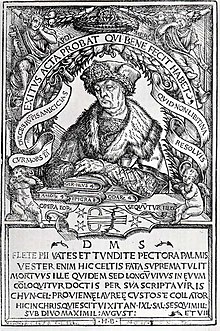This article includes a list of general references, but it lacks sufficient corresponding inline citations. (September 2021) |
Conrad Celtes | |
|---|---|
 Epitaph of Conrad Celtes, woodcut by Hans Burgkmair, 1507 | |
| Born | 1 February 1459 Wipfeld (present-day Lower Franconia) |
| Died | 4 February 1508 (aged 49) |
| Nationality | German |
| Other names | Conradus Celtis Protucius |
| Education | University of Cologne (B.A., 1479) University of Heidelberg (M.A., 1485) Jagiellonian University |
| Scientific career | |
| Fields | History |
| Institutions | University of Ingolstadt University of Vienna |
Conrad Celtes (German: Konrad Celtes; Latin: Conradus Celtis (Protucius); 1 February 1459 – 4 February 1508) was a German Renaissance humanist scholar and poet of the German Renaissance born in Franconia (nowadays part of Bavaria). He led the theatrical performances at the Viennese court and reformed the syllabi.
Celtis is considered by many to be the greatest of German humanists and thus dubbed "the Archhumanist" (Erzhumanist). He is also praised as "the greatest lyric genius and certainly the greatest organizer and popularizer of German Humanism".[1][2][3][a]
- ^ Eire, Carlos M. N. (28 June 2016). Reformations: The Early Modern World, 1450-1650. Yale University Press. p. 223. ISBN 978-0-300-22068-1. Retrieved 6 January 2022.
- ^ Kallendorf, Craig W. (15 April 2008). A Companion to the Classical Tradition. John Wiley & Sons. p. 174. ISBN 978-1-4051-7202-8. Retrieved 6 January 2022.
- ^ a b The Germanic Review. Heldref Publications. 1951. p. 148. Retrieved 6 January 2022.
Cite error: There are <ref group=lower-alpha> tags or {{efn}} templates on this page, but the references will not show without a {{reflist|group=lower-alpha}} template or {{notelist}} template (see the help page).